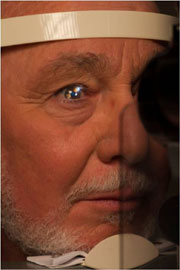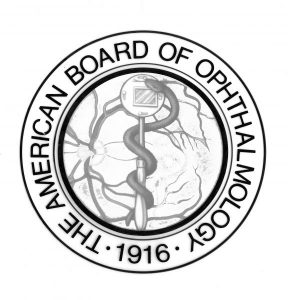Cataract Surgery in Port Orange
As cataracts grow, they can cause more symptoms. You could have dimmed, blurred, or yellowed vision. You may also have double vision when you look at things through the eye affected by the cataract. These problems can make it harder to read, work on a computer, and do anything else that calls for clear eyesight.
You may have poor night vision and find it harder to drive when it’s dark. People with advanced cataracts can even fail the vision part of a driver’s test.
Cataracts can make you more sensitive to glare from the sun. You might see a halo around bright lights. This can keep you from being outdoors as much as you’d like. It also makes it harder to play some sports, such as skiing or golf.
If you have any of these symptoms, surgery could help.
Your ophthalmologist will examine and test your eyes to make a cataract diagnosis. This comprehensive eye exam will include dilation. This means eye drops will widen your pupils.
 Slit-lamp exam
Slit-lamp exam
Your ophthalmologist will examine your cornea, iris, lens and the other areas at the front of the eye. The special slit-lamp microscope makes it easier to spot abnormalities.
Retinal Exam
When your eye is dilated, the pupils are wide open so the doctor can more clearly see the back of the eye. Using the slit lamp, an ophthalmoscope or both, the doctor looks for signs of cataract. Your ophthalmologist will also look for glaucoma, and examine the retina and optic nerve.
Refraction and visual acuity test This test assesses the sharpness and clarity of your vision. Each eye is tested individually for the ability to see letters of varying sizes.
Once I have a cataract diagnosis, what should I do?
-
Have an eye exam every year if you’re older than 65, or every two years if younger.
-
Protect your eyes from UV light by wearing sunglasses that block at least 99 percent UV and a hat.
-
If you smoke, quit. Smoking is a key risk factor for cataracts.
-
Use brighter lights for reading and other activities. A magnifying glass may be useful, too.
-
Limit driving at night once night vision, halos or glare become problems.
-
Take care of any other health problems, especially diabetes.
-
Get the right eyeglasses or contact lenses to correct your vision.
-
When it becomes difficult to complete your regular activities, consider cataract surgery.
-
Make an informed decision about cataract surgery. Have a discussion with your ophthalmologist about:
-
the surgery,
-
preparation for and recovery after surgery,
-
benefits and possible complications of cataract surgery,
-
cataract surgery costs,
-
other questions you have.
-











